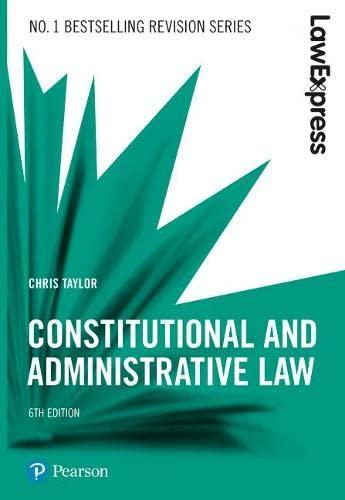Question
Assignment 2 DAA6B 1. There are three main purposes or goals of sentencing. Which of the following is NOT one of these? a. deterrence b.
Assignment 2 DAA6B
1. There are three main purposes or goals of sentencing. Which of the following is NOT one of these?
a. deterrence b. retribution c. restoration d. revocation
2. Which of the following is NOT normally part of the specific portion of the criminal prosecution process known as the "booking"?
a. fingerprinting the defendant b. obtaining biographical information from the defendant c. the defendant is brought before a magistrate d. allowing the defendant to make a phone call
3. The purpose of a writ of habeas corpus is __________.
a. determining the legality of detention b. determining fitness to stand trial c. petitioning for early release on the grounds of good behavior d. challenging a sentence as unjust
4. Information are charges filed by __________, and indictments are charges filed by __________.
a. a grand jury, prosecutors b. prosecutors, a grand jury c. a magistrate, a prosecutor d. a magistrate, a grand jury
5. The legal phrase mens rea can be loosely defined as __________.
a. capacity to commit the crime b. evidence of guilt c. mental fitness to stand trial d. criminal intent
6. The purpose of filing a motion in limine is to __________.
a. preclude anticipated inadmissible or prejudicial evidence b. force the other party to reveal evidence relevant to a case c. suppress the publication of trial details d. request that a case be dismissed due to lack of evidence
7. The term "scienter" relates to __________.
a. general intent b. specific intent c. bothaandb d. none of the above
8. Which of the following is the MOST accurate statement about discovery?
a. Discovery is purely a civil procedure and does not take place in criminal prosecutions. b. Discovery takes place only in criminal prosecutions, never in civil cases. c. Discovery takes place in both civil and criminal cases, but is much more limited in civil cases. d. Discovery takes place in both civil and criminal cases, but is much more limited in criminal cases.
9. A traffic offense such as speeding falls under the definition of __________.
a. strict liability b. transferred intent
c. constructive intent
d. all of the above
10. Direct examination consists MAINLY of __________ questions, and cross- examination consists mainly of __________ questions.
a. follow up, leading b. leading, open ended c. open ended, closed d. closed, open ended
11. When a person has direct physical control over an object it is called __________ possession.
a. constructive b. mere c. knowing d. actual
12. The purpose of an "Allen charge" is to __________. a. instruct the jury to ignore certain inadmissible evidence b. encourage jurors in the minority to re-examine their position c. move for a directed verdict d. disqualify a juror
13. Which of the following is NOT one of the three subgroupings of inchoate crimes? a. attempts b. negligence c. solicitation d. conspiracy
14. A "hung jury" is one that __________.
a. cannot reach a verdict because of disagreement b. has disqualified itself by violating a judge's directive c. has reached a hasty guilty verdict d. has been disbanded due to sudden end to a trial, such as when there is a change of plea or a plea bargain
15. The two defenses in the context of attempt are __________ impossibility and __________ impossibility.
a. criminal, civil b. active, passive c. legal, factual d. factual, virtual
16. What effect do mitigating factors have on sentencing?
a. They tend to cause sentencing to be delayed. b. They tend to cause stricter sentences to be imposed. c. They tend to cause consecutive sentences to be imposed. d. They tend to cause lesser sentences to be imposed.
17. When one person is held accountable for the actions of another it is termed __________ liability.
a. corporate b. joint c. codependent
d. vicarious 18. A felon is sentenced to three concurrent sentences of 5 years. Assuming that the felon is not paroled or released early, how long will he remain in prison?
a. 5 years b. 7 1/2 years c. 10 years d. 15 years
19. There are four sanctions that a sentencing authority may impose. Which of the following is NOT one of these?
a. death b. banishment c. imprisonment d. probation
20. Which of the following is the sentencing authority in a criminal case?
a. the judge b. the jury c. bothaandb d. none of the above
Step by Step Solution
There are 3 Steps involved in it
Step: 1

Get Instant Access to Expert-Tailored Solutions
See step-by-step solutions with expert insights and AI powered tools for academic success
Step: 2

Step: 3

Ace Your Homework with AI
Get the answers you need in no time with our AI-driven, step-by-step assistance
Get Started


